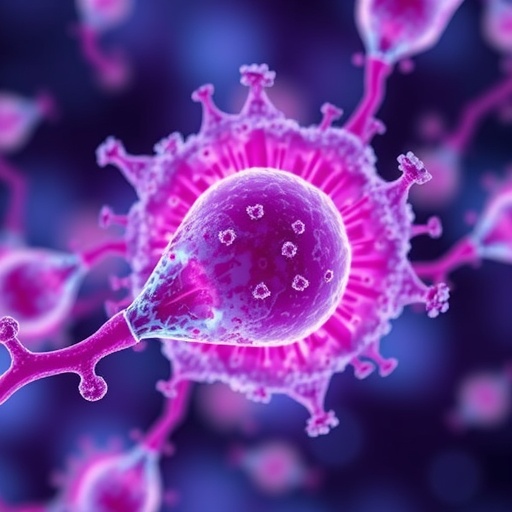In the evolving field of regenerative medicine, stem cell therapy has emerged as a groundbreaking option for treating a wide range of female reproductive disorders. The recent comprehensive review by Nair et al. in the Journal of Ovarian Research illuminates the promising potential that these innovative therapies hold for women experiencing conditions such as infertility, polycystic ovary syndrome, and premature ovarian failure. This research, which consolidates various studies and findings, sheds light on the mechanisms by which stem cells can restore reproductive health and offers insight into future clinical applications.
The review highlights the complexity of female reproductive disorders, emphasizing how they can profoundly affect women’s physical and emotional well-being. Traditional treatments often fall short, particularly in cases of ovarian dysfunction and uterine abnormalities. By integrating stem cell therapies into treatment regimens, there is potential to not only restore fertility but also enhance overall reproductive health, thus providing hope to countless women facing these challenging conditions.
Central to this discussion is the unique capability of stem cells to differentiate into various cell types and their ability to regenerate damaged tissues. Nair et al. delve into the different sources of stem cells, including embryonic stem cells, induced pluripotent stem cells (iPSCs), and mesenchymal stem cells. Each type offers distinct advantages depending on the specific application within reproductive health. For instance, mesenchymal stem cells are particularly noted for their immunomodulatory properties, which allow them to work effectively in environments that typically resist healing.
The review reveals a significant body of evidence supporting the use of stem cells in treating endometriosis, a condition that can lead to chronic pain and infertility. By utilizing stem cells to repair and regenerate endometrial tissue, the potential for alleviating symptoms and restoring normal reproductive functioning is significant. Furthermore, clinical trials cited by Nair et al. demonstrate improved outcomes in women who have undergone stem cell treatments as opposed to traditional therapies, making a compelling case for the integration of these therapies into standard care.
Additionally, the authors discuss the use of stem cells in the context of ovarian dysfunction, particularly premature ovarian failure (POF). This debilitating condition can drastically reduce a woman’s quality of life and fertility potential. The review presents evidence from recent studies suggesting that stem cell transplantation can rejuvenate ovarian function, leading to restored hormone production and the potential for natural conception. This breakthrough could change the landscape of fertility treatments, providing new life to women who previously had limited options.
The safety and ethical considerations surrounding stem cell therapies are also critically analyzed. While the promise of regenerative medicine is immense, ethical dilemmas remain, particularly with the use of embryonic stem cells. The review underscores the necessity for stringent regulatory frameworks to ensure that treatments are both effective and ethically sound. It advocates for transparency in clinical practices, urging researchers and clinicians to prioritize patient safety and informed consent as these therapies become more widespread.
Nair et al. also explore the implications of stem cell therapy for conditions like fibroids and uterine adhesions, which can hinder reproductive capabilities. The regenerative potential of stem cells may offer innovative treatment avenues for reconstructing tissues damaged by these conditions. The authors highlight pivotal studies that showcase how transplanted stem cells can integrate into the uterine architecture, promoting healing and improving fertility outcomes. This aspect of therapy could mark a paradigm shift in how we approach commonly observed gynecological issues.
The review further underscores the importance of interdisciplinary approaches in advancing stem cell research. Collaboration among clinicians, molecular biologists, and bioengineers is crucial to develop effective delivery methods for stem cell therapies. Techniques such as 3D bioprinting and nanotechnology may offer novel ways to enhance the viability of stem cells once introduced into the reproductive system, thereby ensuring maximal effectiveness and patient outcomes. This multifaceted approach could accelerate the translation of basic research findings into clinical practice, ultimately benefiting the patient population.
Moreover, the socio-economic implications of integrating stem cell therapies into gynecological treatments are significant. Improved fertility treatments can lead to reduced healthcare costs associated with prolonged infertility and related health complications. Nair et al. discuss how addressing female reproductive disorders through advanced therapies can have broader societal impacts, including improved mental health outcomes, reduced stigma around infertility, and enhanced family dynamics. The potential for stem cell therapies to empower women and improve their quality of life resonates strongly through the findings outlined in the review.
As the field progresses, continued research and clinical trials will be imperative in refining stem cell therapies for female reproductive health. The review concludes with actionable insights for future studies, emphasizing the need for robust clinical protocols to standardize treatment approaches. Additionally, ongoing monitoring for long-term effects and potential complications will be essential in establishing the safety and efficacy of these novel therapies, paving the way for their routine adoption in clinical practice.
Overall, Nair et al.’s comprehensive review provides a crucial framework for understanding stem cell treatments in the realm of female reproductive disorders. As the scientific community continues to unlock the potential of regenerative medicine, there remains a shared optimism that these therapies can transform the landscape of women’s health and empower women on their paths to motherhood.
Subject of Research: Stem Cell Treatments for Female Reproductive Disorders
Article Title: Stem cell treatments for female reproductive disorders: a comprehensive review
Article References:
Nair, R., Agarwal, P., Gadre, M.A. et al. Stem cell treatments for female reproductive disorders: a comprehensive review. J Ovarian Res 18, 161 (2025). https://doi.org/10.1186/s13048-025-01750-y
Image Credits: AI Generated
DOI: 10.1186/s13048-025-01750-y
Keywords: Stem cells, reproductive health, infertility, endometriosis, ovarian dysfunction, regenerative medicine, women’s health.




